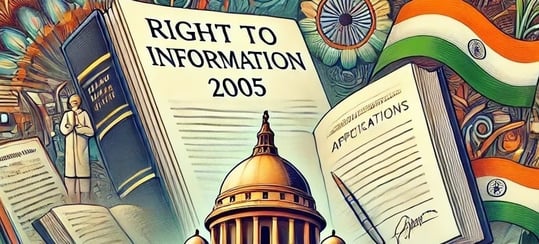The Right to Information Act, 2005 : Promoting Transparency and Accountability
Divyanjali Mishra, 3rd year student at Maharashtra National Law University, Aurangabad & Harsh Jadaun, 2nd year student at Government Law College, Mumbai
12/16/20244 min read


In the prominent case of State of Uttar Pradesh v. Raj Narain (1975), the Supreme Court recognized the right to information as an essential part of the fundamental right to freedom of speech and expression guaranteed under Article 19(1)(a) of the Indian Constitution. The court stated that in a functioning democracy, it is the right of citizens to know about the activities of the government. In this article, we’ll delve into significance of Right to Information Act, 2005, the authorities involved, fees, format, appeals and exemptions for filing an RTI.
WHAT IS THE RIGHT TO INFORMATION ACT, 2005?
The government legislated the Right to Information Act, 2005 through which citizens can seek such information from a public authority which is held by the public authority or which is held under its control. “Public authority” means any institution established under the Constitution; any other law made by Parliament or State Legislature or notification issued or order made by the appropriate Government.
OBJECTIVES OF RIGHT TO INFORMATION ACT, 2005
The Right to Information Act empowers citizens as they can seek information from public authorities.
The act ensures transparency and accountability in the functioning of the government.
The act also helps in controlling corruption in the operations of public authorities.
INFORMATION THAT CAN BE REQUESTED
The provisions of the Right to Information (RTI) Act, 2005 allows Indian citizens to request access to data maintained by authorities. An array of information can be obtained including:
Information on government policies and decisions affecting public.
Budget and Expenditure of government departments and agencies.
Information on public officials such as their salaries, allowances, promotions transfers can be requested.
Official records, reports, documents, emails, memos, and any other pertinent information held by public authorities.
Information seeking reasons for government’s administrative or quasi-judicial decisions to affected persons.
FEATURES OF RTI
It obligates public authorities to make suo-motu (on their own accord) disclosure in respect of the particulars of its organization, functions, duties etc. as provided in section 4 of the Act.
Indian Citizens can submit an RTI request either in written application form or electronically specifying the information they are seeking from the government agency. Along with the request application, a small fee is required to be paid.
This act applies to public sector enterprise, government departments, ministries, NGOs which have got substantial funding from government and other institutions established either by the Constitution or, through legislation.
NOTE:
The person is not required to give reasons for seeking information nor is the person required to share personal information other than those required for contacting.
An applicant is not required to pay any fee, if he belongs to Below Poverty Line (BPL) category.
TIME BOUND RESPONSES AND APPEALS
Government agencies must give response to RTI requests, within 30 days of receiving them. The response time is shortened to 48 hours, if the information requested pertains to someone’s life or liberty.
If a citizen is not satisfied with the response, he has an option to file an appeal to the First Appeal Authority (FAA).
First appeal should be filed within a period of 30 days from the date on which the limit of 30 days of supply of information is expired or from the date on which the information or decision of the Public Information Officer is received. The appellate authority shall dispose of the appeal within a period of 30 days or within 45 days in exceptional cases of the receipt of the appeal. (Sec 19(1) of RTI Act,2005)
A second appeal with the Central Information Commission must be filed within 90 days from the date on which the decision should have been made by the first appellate authority or was actually received by the appellant. Sec 19(3) (Sec 7(5) of RTI Act, 2005)
EXEMPTIONS FOR FILING AN RTI
The applicants must abstain from seeking information exempted under Section 8 and 9 and also from the institutions included in the Second Schedule except information relating to allegations of corruption and human rights violations. (Sec 8,9 of RTI Act,2005)
IMPORTANT WEBSITES
(i) Government of India (http://indiaimage.nic.in).
(ii) Right to Information Portal (www.rti.gov.in).
(iii) Website of Central Information Commission (http://cic.gov.in).
TO WHOM THE RTI BE FILED TO?
Citizens seeking information have to make an application to the Central Public information Officer (CPIO) of the concerned public authority. The application should be in writing and language can be Hindi, English or in the official language of the area in which the application is made. The information required should be specified in the application. And then the required minimal fees had to be paid as was discussed above.
How to know who is the CPIO? All the public authorities have designated their CPIO and have posted the required information about CPIO on their websites. The same can be accessed on the ‘RTI PORTAL’ (www.rti.gov.in). Also, if the name of CPIO is not found on the website of the concerned public authority, then application may be sent to the CPIO without specifying name at the address of the public authority.
NOTE: If a person is unable to make a request in writing, he may seek the help of the CPIO to write his application.
CONCLUSION
The RTI Act of 2005 is a significant law that upheld values like accountability, transparency and citizen empowerment in governance. It promotes responsiveness and trust in the governance. However, there are challenges such as tackling delays in addressing RTI requests, raising awareness among the citizens about the Act and enhancing the mechanisms for its implementation to restrict any misuse or exploitation of the law. By encompassing the principles of the Act and working towards its execution we can unlock its benefits in nurturing a well-informed democratic society.
Rights
Empowering individuals with legal updates.
Duties
Law
+917078214478
© 2024. All rights reserved.
lawblogs@kanoonkehaath.in
